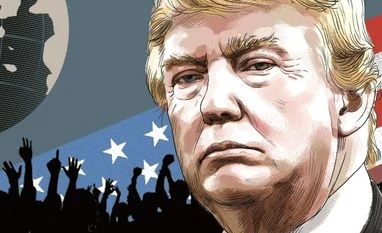US President Donald Trump accused the Organization of the Petroleum Exporting Countries (OPEC) on Friday of “artificially” boosting oil prices after a year-plus pact that has slashed global crude inventories, drawing rebukes from oil-producing countries as prices dipped following his remarks.
“Looks like OPEC is at it again. With record amounts of Oil all over the place, including the fully loaded ships at sea. Oil prices are artificially Very High! No good and will not be accepted!” Trump wrote on Twitter.
It was unclear what triggered the tweet, Trump’s first mention of OPEC on social media during his term. It came shortly after Saudi Arabian officials said they remained far from their goal in reducing a three-year global supply glut. Three officials from the country, the world’s leading oil exporter, told Reuters this week they would be happy to see oil hit $80 or $100 a barrel.
This week, oil prices rose to levels not seen since late 2014. The cartel is expected to restrain supply through the end of this year, and possibly into 2019. Several members of the OPEC responded to the tweet, saying prices were not artificially inflated. Delegates at an OPEC/non-OPEC monitoring committee meeting in Jeddah, Saudi Arabia said oil prices were higher partially because of global political tensions, mentioning sanctions on Venezuela, threats to the Iran nuclear agreement, strikes on Syria and saber-rattling over North Korea.
OPEC Secretary General Mohammed Barkindo said the output cut agreement halted the collapse in global oil prices, and is “on course to restore stability on a sustainable basis in the interest of producers, consumers and the global economy.” We don’t have any price objective in OPEC, and not in this joint endeavor with non-OPEC,” Barkindo said on Friday, in response to Trump’s tweet. “Price is not our objective. Our objective remains restoring stability... on a sustainable basis.”
The group is slated to meet in June to decide next steps after reducing output since January 2017 along with other producers, including Russia.
Trump gave no details on what action his administration might take regarding oil or OPEC, and the White House did not respond to requests for comment. “We have a difficult time seeing how OPEC would in any way be swayed here in terms of changing course, in terms of policy,” said Michael Tran, commodity strategist at RBC. OPEC’s output fell in March to an 11-month low, according to a Reuters survey. The cartel has targeted the five-year average of inventories in 35 Organization for Economic Cooperation and Development (OECD) countries as a barometer for the deal’s success.
As of mid-April, those inventories were 2.85 billion barrels, or 43 million more than the five-year average; a year ago, it was 268 million barrels above that benchmark.
This week, crude futures benchmarks Brent and US West Texas Intermediate (WTI) hit their highest since November 2014, with Brent touching $74.75 and US crude $69.56 per barrel. That has raised fuel costs, with average US prices for gasoline hitting $2.75 a gallon on Wednesday, according to motorist advocacy group AAA, up more than 30 cents from a year earlier. Trump is just trying to relate to his base when it comes to the retail gasoline prices, so he is blaming OPEC for this,” said Josh Graves, senior market strategist at RJO Futures in Chicago. Brent crude futures were at $73.66 per barrel at 12:01 pm EST (1601 GMT), down 13 cents from their last close. WTI futures were down 6 cents at $68.19 a barrel. Beyond OPEC’s supply management, crude prices have been supported by expectations that Washington will re-introduce sanctions on OPEC-member Iran, and might expand sanctions against Venezuela after that country’s presidential elections next month.
This year’s budget agreement includes the sale of about 100 million barrels of crude oil — about 15 per cent of the reserve — as US oil production recently hit a record at more than 10 million barrels a day.
Analysts said it signaled Washington was less concerned about global shortages.
"One of the major variables that's fueling the rally in oil prices is the markets perception that (Trump's) administration is taking an increasingly hawkish stance on foreign policy," Tran said.
Hedge funds and other speculators hold a record level of bullish bets in Brent, on expectations of further price rises.
The U.S. government cannot legally influence oil prices other than through releasing oil from its strategic reserves which it does occasionally.
This year's budget agreement includes the sale of about 100 million barrels of crude oil - about 15 percent of the reserve - as U.S. oil production recently hit a record at more than 10 million barrels a day. Analysts said it signaled Washington was less concerned about global shortages.
"Washington has fully given up this idea of scarcity. You dont get to the point of selling your strategic reserves to balance your budget if you think the world is short," said Kevin Book, managing director at Clearview Energy Partners.
Unlock 30+ premium stories daily hand-picked by our editors, across devices on browser and app.
Pick your 5 favourite companies, get a daily email with all news updates on them.
Full access to our intuitive epaper - clip, save, share articles from any device; newspaper archives from 2006.
Preferential invites to Business Standard events.
Curated newsletters on markets, personal finance, policy & politics, start-ups, technology, and more.
)